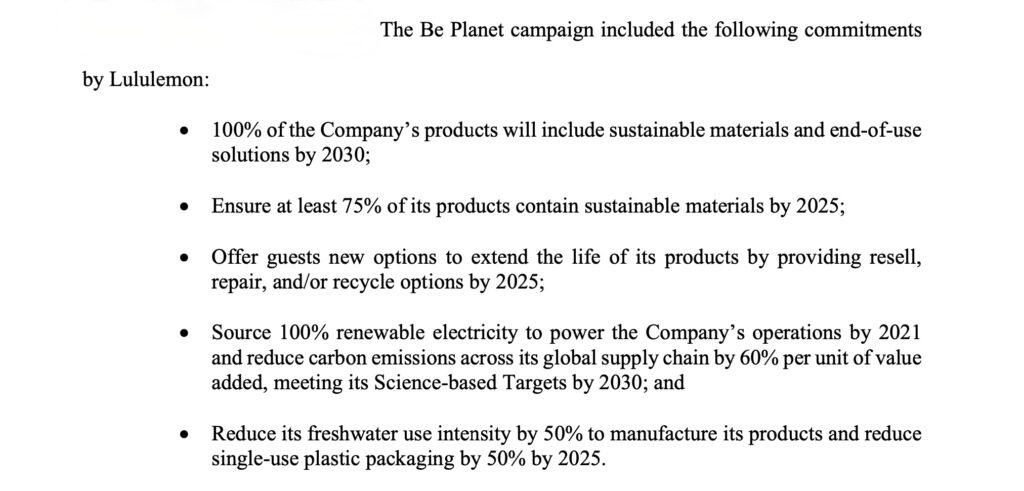Lululemon Athletica has beaten a lawsuit accusing it of deceiving consumers by way of misleading statements over its commitment to the environment. In an order this week, a federal court in Florida sided with the athleisure giant, holding that the pool of consumer plaintiffs failed to sufficiently allege that they suffered an injury in fact to support their claims for monetary damages and injunctive relief as a result of Lululemon’s alleged practice of making and marketing “a number of direct environmental claims about [its] products and actions that are false, deceptive, and/or misleading.” The latest round of the case highlights challenges that consumers face in holding companies accountable for environmental marketing.
A Bit of Background: In the proposed class action lawsuit that she filed with the U.S. District Court for the Southern District of Florida in July, Amandeep Gyani alleged that Lululemon improperly presents itself as a “sustainable and environmentally friendly brand,” and has “taken advantage of consumers and their trust through a massive, global ‘greenwashing’ campaign.” Gyani claimed that she – and other class members, including consumers from Florida, New York, and California – suffered economic injury because Lululemon’s misleading greenwashing campaign caused them to pay a price premium for the company’s products and is likely to be subject to the same harm in the future.

Lululemon (successfully) countered the lawsuit by arguing, among other things, that the plaintiffs’ boilerplate price premium allegations are insufficient to assert an economic injury, and they need to set forth facts that its products “were defective or worthless.” And beyond that, Lululemon maintained that the plaintiffs lack standing for injunctive relief because they have not alleged an imminent threat of being harmed again in a similar manner.
A Win for Lululemon
In her February 19 decision, Judge Beth Bloom dismissed the plaintiffs’ amended complaint without prejudice. Siding with Lululemon, the court held that the plaintiffs fell short on adequately pleading Article III standing. Siding with Lululemon, the court held that the plaintiffs fell short in alleging injury in fact, both in connection with their bid for monetary damages or injunctive relief.
> Monetary Damages: At the heart of the plaintiffs’ bid for monetary damages is their claim that they paid a price premium for Lululemon products based on misleading marketing about sustainability. The court found the allegations to be insufficient on the basis that the plaintiffs failed to establish a direct link between the alleged misrepresentations and the value of the products; did not allege that the products were “defective or worthless” due to the allegedly fraudulent environmental claims; and relied on subjective beliefs about paying a premium without showing how Lululemon’s “greenwashing” materially impacted the product value.
In particular, the court held that the plaintiffs “fail to tie any aspect of Lululemon’s statements to the purported price premium that [they] paid for Lululemon’s products.” As such, “these blanket assertions are insufficient to constitute an economic injury, and therefore, the plaintiffs lack Article III standing.” At the same time, the court found that the plaintiffs did not allege that there was “any deceptive act or unfair practice regarding the products sold to [them].” Instead, Judge Bloom held that “deception” that they “purportedly relied on amounts to nothing more than goals and promises contained in a press release or on Lululemon’s website.”
In other words, while the plaintiffs may have felt misled, they did not demonstrate an economic injury that meets the legal standard for injury in fact, according to the court, which emphasized that mere dissatisfaction or buyer’s remorse is not enough to establish standing for monetary damages.
> Injunctive Relief: The plaintiffs also sought injunctive relief, arguing they would purchase Lululemon products again in the future if they could trust the company’s environmental marketing. Unpersuaded, the court took issue with the plaintiffs’ claims that they “would like” to purchase Lululemon’s products again in the future, but “only if” they can rely on Lululemon “to be truthful in their marketing statements regarding the sustainability and environmental impact of Lululemon’s products and actions.”
The court cited precedent from the Eleventh Circuit, which previously determined that allegations that consisted of “‘some day’ intentions – without any description of concrete plans, or indeed even any specification on when the some day” – were “plainly insufficient to establish a threat of imminent or actual harm,” and thus, “do not support a finding of the ‘actual or imminent’ injury that our cases require.” Against this background, the court held that the plaintiffs fail to allege any threat of imminent injury (and instead, put forth speculative statements) and therefore, lack standing to pursue injunctive relief.
Implications for Other Greenwashing Lawsuits
The court’s dismissal of the lawsuit against Lululemon without prejudice allows the plaintiffs to refile their complaint if they can better establish standing, and while this decision does not speak to the substance of Lululemon’s environmental claims, it, nonetheless, highlights the legal complexities in proving economic injury in connection with “green” marketing claims. Specifically, the ruling reinforces a high bar for plaintiffs to demonstrate concrete economic injury linked to deceptive environmental claims, and real and immediate threat of future harm for injunctive relief.
The case is Gyani v. Lululemon Athletica Inc., 1:24-cv-22651 (S.D. Fla).











